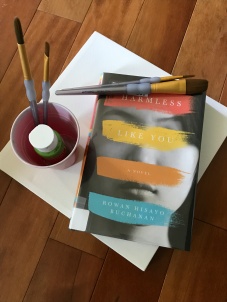“She just needed to find somewhere clean and clear to think. She would find a way of loving that didn’t maim. Then as soon as she was worthy of these people, she’d come back.”
 In her debut novel, Rowan Hisayo Buchanan spins a complicated story about Yukiko, the daughter of Japanese immigrants who has only known life in America. As a young woman in the New York City of the late 1960s, Yuki is silent and adrift. She feels utterly invisible, unseen by and unconnected to those around her. Her parents welcome the chance to move ‘home’ to Japan, but Yuki is unsure. As unsettled and lost as Yuki feels in New York, as much as she aches at her ‘otherness’, she resists the idea of a move to Japan – one that wouldn’t really be a return, but a new beginning, another challenge to find her fit.
In her debut novel, Rowan Hisayo Buchanan spins a complicated story about Yukiko, the daughter of Japanese immigrants who has only known life in America. As a young woman in the New York City of the late 1960s, Yuki is silent and adrift. She feels utterly invisible, unseen by and unconnected to those around her. Her parents welcome the chance to move ‘home’ to Japan, but Yuki is unsure. As unsettled and lost as Yuki feels in New York, as much as she aches at her ‘otherness’, she resists the idea of a move to Japan – one that wouldn’t really be a return, but a new beginning, another challenge to find her fit.
“Yuki had visited her grandparents once, and while she’d befriended their dog, she couldn’t do anything right for the humans. How many languages had four conjugations for My name is Yukiko, one for each level of politeness? And who knew that being too deferential could be considered a form of rudeness? Yuki was a chizubaga – enough to make a Japanese person sick and still inauthentically American.”
“To her father, America was a snare. It was as if each time he said the Pledge of Allegiance, America’s rope tightened, and now he was finally about to struggle free. She didn’t want to hurt him. But she didn’t want to return to a country of offerings to the dead.”
Amazingly, Yuki convinces her parents to let her stay in America and live at her friend Odile’s apartment. Odile lives with her bohemian mother in a world without structure or limits. It is a world Yuki covets and yet one in which she is even more at sea, more other.
“The apartment was a nation with its unique barbarisms. Yuki told herself that Odile would be just as lost if the situation were reversed, but it was a lie. In Rome do as the Romans, but everywhere else the Romans had made damn sure the locals did as the Romans. Odile contorted the world to her will.”
Odile, whom Yuki follows unquestioningly, slinking in her shadow and blending into the background, is explicitly the goal, the ‘ideal’ American in Yuki’s mind. Her life force, her unbending, unapologetic personality, are irresistible to Yuki, even though their friendship is clearly toxic.
Yuki is a main character with detailed plot points but little depth – not as in superficial, but as in flat, hollow, enigmatic. She exhibits minimal personality. Her struggle to be seen by the world is vividly replicated in the reader’s struggle to see her. “Harmless Like You” is all about Yuki’s lifelong difficulty connecting emotionally to the people and the world around her. The reader endeavors to decode Yuki, learning in tiny flits and sparks about this enigmatic character. Buchanan alternates her trail of breadcrumbs between narrating young Yuki’s life and shadowing Yuki’s son Jay as he seeks to know the woman who abandoned him as a baby.
“Harmless Like You” is a rare treat – a character study in which the main character, despite never fully coming into focus, is immensely compelling. Yuki’s disquiet is visceral, and the entire novel conveys a sense of otherness that is profound and permanent. Buchanan’s prose is often serene and still, leavened with brilliant barbs of sarcasm and wit. A delightful, touching debut.
“Artists will tell you they don’t draw objects. They draw the way light falls. The puppet strings that jerk our emotions are woven of photons. The power of moonlight is famous. March morning light stroking your wife’s face can end a fight. A headachy, halogen glare can start one. We need light. Without it, we get melatonin deprivation, our immune systems crash, our internal rhythms get lost. In long, dark, northern winters, people shoot themselves in the head.”

That sounds good! I’ve not yet heard about this book. I wonder, do you feel like the author gave you a good glimpse into 1960’s New York City?
LikeLike
Hmm. Good question. In some ways, yes, though the focus was definitely on the interpersonal more than on the external cultural environment. It certainly isn’t as deep a look as, say, Good Girls Revolt.
LikeLike